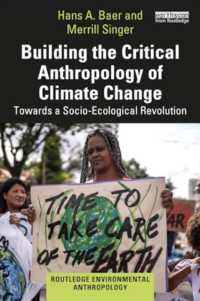- ホーム
- > 洋書
- > 英文書
- > Science / Mathematics
Full Description
Growing concerns about the impacts of climate change and dependence on fossil fuels have intensified interest in bioenergy from sugar cane and other crops, highlighting important links between energy, environment and development goals. Sub-Saharan Africa is characterized by severe poverty; the possibility to exploit a renewable energy resource offers valuable avenues for sustainable development and could support a more dynamic and competitive economy. This book describes how the bioenergy expansion will improve rural livelihoods, reduce costly energy imports, reduce GHG emissions, and offer new development paths.
Drawing on international experience, it is shown that harnessing this potential will require significant increases in investment, technology transfer, and international cooperation. Because of its high efficiency, the authors argue that sugar cane should be viewed as a global resource for sustainable development and should command much greater focus and concerted policy action. Through an analysis of the agronomy, land suitability and industrial processing of sugar cane and its co-products, along with an assessment of the energy, economic and environmental implications, this volume demonstrates that sugar cane offers a competitive and environmentally beneficial resource for Africa's economic development and energy security.
With forty-four authors representing thirty organisations in sixteen countries, the book offers a truly international and interdisciplinary perspective by combining technical and economic principles with social, political and environmental assessment and policy analysis.
Contents
1. Renewable Resources from Sugar Cane: The Energy, Environment and Development Context for Africa Part 1: Agriculture 2. Sugarcane Physiology, Breeding and Biotechnology 3. Agroecological Zoning and Biofuels: The Brazilian Experience and the Potential Application in Africa 4. Land Suitablility and Crop Handling Part 2: Industry 5. Sugar Cane Processing and Energy Generation from Fibre Resources 6. Ethanol Production from Cane Resources 7. Other Co-Product Options from Cane Resources Part 3: Markets 8. Sugar Reforms, Ethanol Demand and Market Restructuring 9. Implementation, Strategies and Policy Options for Sugar Cane Resources and Bioenergy Markets in Africa 10. International Experiences: Sugar Cane Bioenergy Markets and Trade Part 4: Impacts and Sustainability 11. Sustainability Assessment of Energy Production from Sugar Cane Resources 12. Certification and Standards for Sugar Cane and Bioenergy: Experiences with Development and Application and their Relevance for Africa 13. Sugar Cane Energy Production and Climate Change Mitigation: A Case Study for South Africa Part 5: Strategic Issues and Comparisons 14. The Development of Biofuel Capacities: Strengthening the Position of African Countries through Increased Energy Security 15. The Role of Ethanol from Sugarcane in Mitigating Climate Change and Promoting Sustainable Development in LDCs: the Case of Nepal 16. Biofuels Technology Change Management and Implementation Strategies: Lessons from Kenya and Benin 17. Financing and Investment for Sugar Cane and Bioenergy in Africa 18. Conclusions







